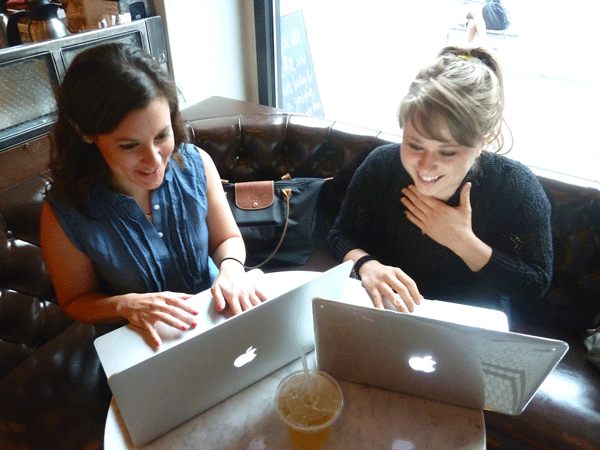
Melissa Carbone, left, and Krystle Bates, are two of many Downtown workers who came to the tech industry from different fields.
BY ROSA KIM | Melissa Carbone never imagined she would grow up to be a software engineer.
“I was always telling myself that I had to be good at math and that I wasn’t the kind of person who could code. That kept me away from the field,” she said. “Until I realized that I was sitting in front of a computer all day anyway and I might as well be creating something.”
Carbone, 30, is now a junior software engineer at a start-up called Intent Media, one of 688 tech businesses in Lower Manhattan according to the Downtown Alliance. She is a licensed mental health counselor in New York, and before becoming a software engineer, she worked as an applied behavior science specialist with adults with developmental disabilities and as an assistant director at a homeless shelter in Brooklyn. Carbone said she wasn’t fulfilled at these organizations where staff were often overworked and underpaid.
“I was tired of working in environments where most employees, including myself, were unhappy with their jobs,” she said. “I burnt out really quickly. I wasn’t really using the skills that I had learned in school. I wanted to look forward to going to work everyday and I knew that the only way I could make that happen was to make a dramatic change in my career.”
A year ago, she decided that it was time to make that change and enrolled in a coding boot camp called Launch Academy in Boston. For three months, she spent six days a week, ten plus hours a day learning how to code.
Carbone is one of many career changers in the tech industry with no formal computer science background who left another profession to become a software engineer, web, or app developer. She said at Launch Academy, her classmates included chefs, teachers, psychologists, and people in finance who were not happy with their jobs.
“We were all serious about making a big change,” Carbone said. “You can be someone who has a doctoral degree or someone who never went to college. It’s all about how much work you put into it.”
Dan Pickett, 30, co-founded Launch Academy with Evan Charles after working in consulting. He was constantly asked by companies to refer them to candidates with computer science training and there weren’t enough people to meet the demand.
“It bothered me that there was all this demand and not enough people to fill it,” Pickett said.
According to Code.org, computer science jobs are growing at twice the rate of the national average. The site projects that by 2020, one million more jobs will exist than there are students to fill them.
Pickett believes there is something inherent about technology and the Internet that welcomes people from a wide range of backgrounds. Your ability to code has little to do with what you studied in college, he added.
“Even programs before ours, some of the best developers I knew had what I considered a non-traditional background,” he said. “There are always a good number of people who had backgrounds in finance and mathematics and lots of musicians, inspiringly enough. They take to the concept of software development easily.”
For Carbone, software engineering gives her the creative license that she had craved in her past jobs.
“It’s very empowering—you have the skills to build a website that could be anything that comes out of your head. You don’t need a cofounder and you don’t need to put your idea into somebody else’s hands,” Carbone said. “I’ve always been drawn to creative activities like music. You get a sense of accomplishment out of that. This is just a natural extension of that for me.”
Kun Qian, an application developer for an electronic wholesale distribution company, believes that there are challenges to teaching yourself programming.
“I know people who felt that there were too many holes. It’s hard to fill all of them. And it takes too long to do it by yourself,” she said.
But the rewards of seeing it come together after overcoming obstacle after obstacle are worth it, she said.
“It’s like dancing—you learn the moves but you eventually have to dance. In the beginning you struggle but once you put everything together you can move fluidly in this field,” Qian said.
Krystle Bates, a junior Ruby on Rails developer at a start-up called Flinja, located on 222 Broadway, was in her own words, “an all around go-to” for a boutique investment bank before she taught herself HTML and CSS using online resources such as Codeacademy. She later attended Launch Academy to learn Ruby on Rails, an open source web application framework.
“There are all kinds of resources to help people transition. I had no idea how to do it because I had no friends in tech, no exposure to people who developed. I didn’t know anything about it,” Bates said.
Making the decision to pursue a completely different career wasn’t easy, Bates said.
“You have to ask yourself, ‘Will I be better off or equal to where I am?’ You don’t want to be worse off. ‘Am I making the right choice? Or am I risking everything to end up with nothing?’ I wanted to make sure if I was going to take a risk, I wasn’t going to be at the same place I was before,” she said.
What drew Bates to the tech industry was the ability to make something from scratch and to be able to support a variety of causes.
“In tech, you can work for a sports company or a nonprofit and you will be making a difference,” she said.



































